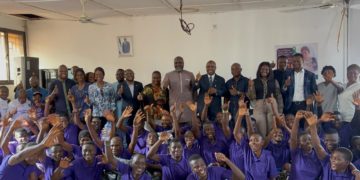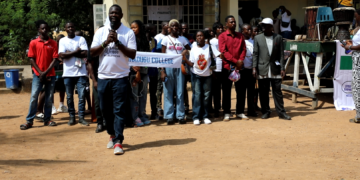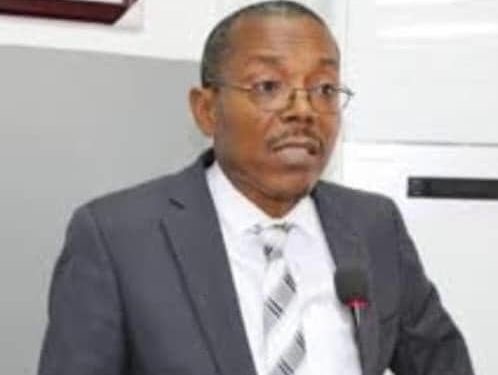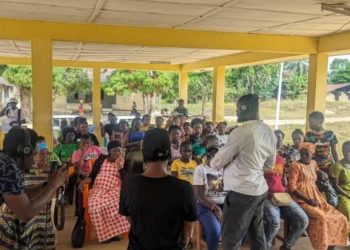By Tejan Macavoray
“They stole my iPad, my children’s medicine, and NLe60,000 in cash. They didn’t even acknowledge my title. I am a sitting Member of Parliament, yet I was treated like a criminal in my own country,” says Juliana Aliematu Fatorma, MP, while recounting her forceful eviction from her home in Mayenkineh, Upper Allen Town.
Hon. Fatorma, a Member of Parliament from Kenema District, never expected to wake up to the sound of boots and bulldozers at her doorstep. But at dawn, her home was raided. Belongings were stolen, her professional identity erased, and her family subjected to humiliating displacement.
“I have lived here for years,” she said, “but that morning, I was no longer a lawmaker — I was just another voiceless victim.” Her experience is not isolated. It is emblematic of a national crisis — a growing epidemic of land grabbing and forced demolitions that is turning Sierra Leone’s poor, vulnerable, and even its elected officials into refugees within their own country.
In Sierra Leone, a disturbing rhythm now echoes across hillsides and hinterlands — like a broken national anthem: the roar of bulldozers, the cries of the displaced, and the silence of accountability. What was once a country healing from war and natural disaster is now witnessing a new wave of structural violence — one that replaces guns with land deeds and peace with dispossession.
From Freetown’s coastal edges to rural enclaves, demolitions and land grabs have surged. Once labeled as isolated events, they now reflect a well-oiled machinery of institutionalized suppression. Under the pretext of “urban renewal,” “environmental protection,” or “state land recovery,” thousands are being stripped of their homes and dignity.
Their only crime? Being poor, disconnected, or standing in the way of lucrative development deals.
Land in Sierra Leone is not just property — it is power. Over the past five years, powerful individuals, corporations, and even state actors have weaponized it as a tool of control. Entire communities — Kingtom, Old Wharf, Pentagon, Black Hall Road, Bathurst, Mayenkineh, Allen Town, peninsular areas, like Goderich, Adonkia, Waterloo, have witnessed mass evictions, often with no resettlement, no compensation, and no legal recourse.
Shockingly, many of the victims held official documents signed by the Ministry of Lands. Yet, their homes were razed — only for those same lands to be fenced off and sold to elite developers.
Between 2023 and 2025 alone, more than 1,000 homes were bulldozed. Over 5,000 Sierra Leoneans were forcibly displaced. Some had lived in these communities for over 40 years. Children lost schools. Women lost businesses. Entire families lost history.
“We Were Treated Like Criminals”
One resident, Lamin Conteh, shared: “We’ve survived war, Ebola, mudslides, and COVID — and now this. People have documents, yet we’re still being evicted. We’re citizens of this country, but we were treated like criminals.”
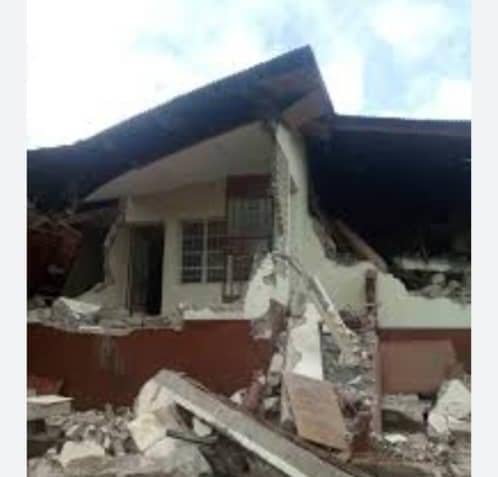
Republic of Sierra Leone Armed Force. Image, Global times Newspaper online.
The Ministry of Lands has offered little clarity. While Director Tamba Dauda vaguely alluded to “dirty games” inside the Ministry, no concrete action has followed. Allegations abound that surveyors and civil servants are profiting from inside information — facilitating illegal sales and overlapping land allocations.
On July 10, 2025, Parliament briefly broke its silence. Acting Speaker and Deputy Speaker, Hon. Ibrahim Tawa Conteh, issued a fierce condemnation: “We condemn the aggression of Lieutenant General Amara Idara Bangura in his attempt to grab land belonging to the Services Secondary School at Juba, West Freetown. Our military should not be seen as land grabbers.”
This rare rebuke signaled that the land crisis is no longer peripheral — it is now a national emergency.
Sierra Leone’s 1991 Constitution guarantees that no property shall be compulsorily acquired without compensation (Section 21). The country is also signatory to several global treaties, including,Universal Declaration of Human Rights (Article 17 – Right to Property),African Charter on Human and Peoples’ Rights (Article 14),FAO Voluntary Guidelines on the Responsible Governance of Tenure
But these legal protections are routinely ignored.
A 2023 Audit Service report implicated the Ministry of Lands in corruption, with land allocated to politically connected individuals, bypassing due process entirely.
Courts are slow. Protests are crushed. Whistleblowers are silenced. Journalists are barred from demolition zones and often face violence.
“They don’t just destroy homes — they destroy voices,” said many Freetown-based civil rights Activists and lawyers.
10,000+ people displaced
Some 15% of displaced children have dropped out of school (Save the Children, 2024),Thousands of women informal traders have lost their livelihood,Mental health support: virtually nonexistent
This is not development. This is trauma, Urban Expansion Greed – Targeting high-value lands in the peninsular and coastline, Political Collusion – Secretive deals between state officials and private developers, Weak Governance – Paper-based land systems vulnerable to forgery and abuse, Suppressed Media – Investigative journalists threatened, harassed, or obstructed.
Organizations like Namati, ILRAJ, and the Sierra Leone Land Alliance have outlined urgent demands,National moratorium on forced demolitions, Establishment of an Independent Land Tribunal,Digitization of land titles and public registry access,Compensation and Resettlement for displaced persons,Audit and transparency of all government land transactions since 2000.
Yet despite these calls, the demolitions continue. The Land Commission remains largely inactive, save for a televised statement from Commissioner General Abubakarr Sappay Foray on AYV’s Wake Up Sierra Leone:
“We have put measures in place for landowners so other people or companies cannot claim their land from them.”
While his remarks suggest an acknowledgment of past failures, they have yet to translate into meaningful change on the ground.
In a landmark ruling, the High Court of Sierra Leone recently ruled against Dr. Turad Senesie and the Ministry of Lands in a highly publicized case. The court found that the Ministry had unlawfully seized land without due process — a powerful legal precedent that could signal the beginning of accountability.
For many Sierra Leoneans, this is not the anthem they want.
When bulldozers become instruments of state policy, when schools are replaced by shopping malls, when the poor are evicted at dawn, and when silence becomes the only response to injustice, the soul of the nation is at stake.
Sierra Leone’s anthem speaks of unity, freedom, and justice. But for those watching their homes turn to rubble, those words now ring hollow.
Development without humanity is destruction. Prosperity without fairness is theft.
The time to rewrite Sierra Leone’s story — in the language of dignity, equity, and justice — is now.





